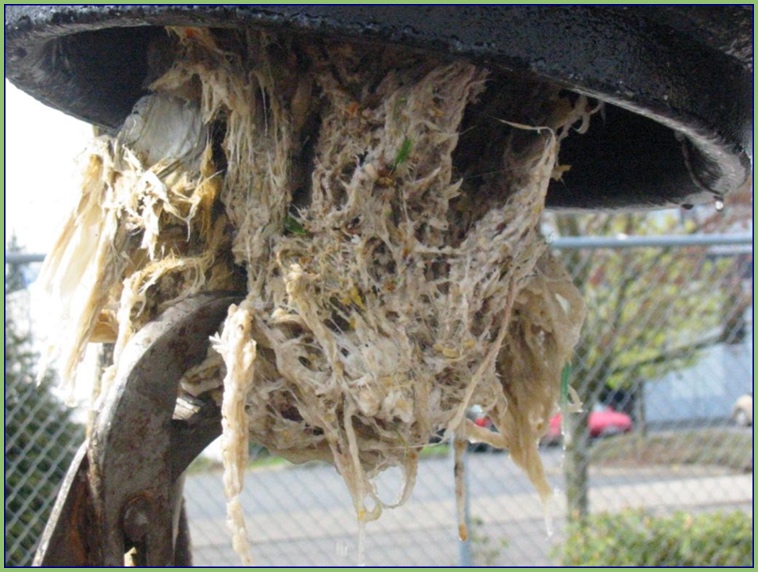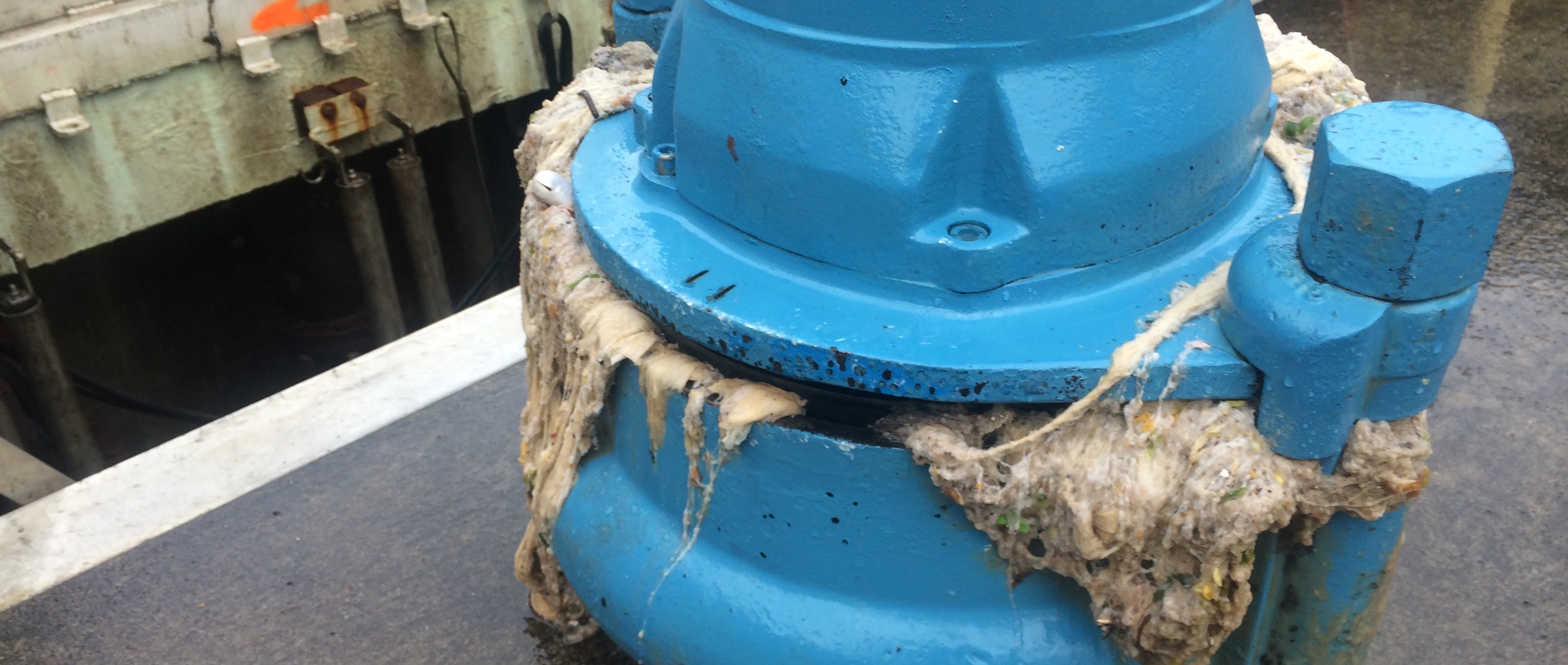With a multitude of people scrambling to buy toilet paper, and some going without, sewer utility officials across the country are worried about the possible repercussions of the TP shortage — such as clogged sewer lines.
Toilet paper and wipes of all kinds have become the subject of a complex, wide-ranging and controversial debate. The issue was even argued this year in the Washington Legislature. But for hard-working public employees who clean out the sewers, the bottom line is simple: DON’T FLUSH ANYTHING BUT TOILET PAPER (unless it’s human waste, of course).

I’ve noticed discussions on social media about all sorts of items that people may be using as alternatives to toilet paper. That’s fine, as long as nobody flushes these things down the toilet. They need to end up in the garbage, not the sewer, as unappealing as that may sound, according to sewer officials. Several news releases have been flying around recently to press this point, including a message this week from Kitsap County:
“As there is a shortage of toilet paper due to COVID-19, the Kitsap County Sewer Utility wants to remind all residents not to flush items such as wipes, paper towels, napkins, and facial tissues. Toilet paper is the ONLY product that is safe to flush. Wipes, even those marketed as flushable, can cause clogs in your plumbing and in sewer and septic systems.”
Needless to say, clogs caused by massive amounts of paper, thin plastic sheets and other items, all wrapped together in huge wads, are a pain for sewer workers to remove, and it can expose them to dangerous pathogens and needles. Clogs are also an unnecessary expense for utilities across the country and throughout the world. It is already a problem, and recent reports suggest that things are getting worse with the shortage of old-fashioned toilet paper. A story in the Global News describes the concerns in England.
To emphasize the problem, sewer workers across the country were challenged to find a photo of the biggest, ugliest clog, also known as a “ragball.” The contest was held in conjunction with the 2015 Water Environment Federation Technical Exhibition & Conference (WEFTEC). Lake Stevens in King County, Wash., took the $500 prize for this picture on the website of JWC Environmental.
In an unrelated story, I once wrote about a ragball that became legal evidence and was discussed openly in courtroom testimony, causing the jury to chuckle. Check out the 1998 article in the Kitsap Sun.
I would like to move on and describe this year’s legislation that addresses the label “Do not flush,” which will soon be required on certain types of products. First, however, I am compelled to ponder the needless run on toilet paper. What are people thinking when they load up their shopping carts with a product that will never be in short supply in the United States — unless it is during uncertain times like these?
Psychologists, including Harvard’s Bella DePaulo, have been tossing out a bunch of ideas about why people might want to hoard toilet paper. You can check out her commentary on PsychCentral. She suggests that it may have something to do with a feeling about hygiene.
“No need to talk about it,” she writes. “Just fill your shopping cart, and maybe you will feel a little cleaner, more comfortable, and more secure. This is about the psychology of stockpiling toilet paper, not the reality of what you actually need and what will in fact protect you.”
Some people blame the late Johnny Carson of “The Tonight Show” for encouraging people to buy toilet paper in times of crisis. In 1973, during a gasoline shortage, Carson picked up a newspaper story that was prompted by a press release from U.S. Rep Harold Froelich, a Republican from Wisconsin. The congressman was worried about a shortage of wood pulp and stated, “We hope we don’t have to ration toilet tissue … ” The day after Carson’s televised monologue, large numbers of people rushed out to stock up on extra rolls. Check out Zachary Crockett’s piece in Priceonomics and see Carson’s joke in the video on this page.
Even without a toilet paper shortage, sewer experts have been struggling to get their message across about not flushing anything but toilet paper. It doesn’t help their cause when an entire industry has been created around the concept of “flushable wipes” and labeling their products as such.
Industry groups — namely the Association of the Nonwoven Fabrics Industry and the European Disposables and Nonwovens Association — claim that products labeled as “flushable” can safely go down the toilet. Meanwhile, organizations representing wastewater operators have largely disputed that claim.
The industry groups have developed testing procedures to show that their “flushable” products will break down on the way to sewage-treatment plants. Meanwhile, an organization of wastewater operators has developed its own tests as part of the International Water Services Flushability Group.
Both sets of tests involve determining whether certain products break apart into fragments after going through a series of pipes and pumps. The biggest difference between the two test procedures is the so-called “slosh box” test, in which the item being tested is agitated in water by rocking the container back and forth, as described to me by Frank Dick, wastewater engineering supervisor for the city of Vancouver, Wash.
The industry’s test uses less water and rocks faster than the test approved by the wastewater operators. As a result, more products break down under the industry’s standard and can be labeled as “flushable” — despite opposition from many city and county utilities. Frank acknowledged that so-called “flushable” products generally break down better than products that don’t meet the standard, which should be labeled “Do not flush.” However, only a few wipes marketed as “flushable” come close to meeting the standard accepted by sewer utilities, he said.
Currently, only toilet paper is approved for disposal in the toilet, according to the International Water Services Flushability Group.
If you think about it, there are good reasons that facial tissues, paper towels, baby wipes, adult wipes and various types of cleaning wipes do not break down on their way to the sewage-treatment plant, said Lisa Edge, education and outreach coordinator for Kitsap County Sewer Utility. Such products are designed to hold up under harsh conditions. Think of the advertisements that claim paper towels can absorb lots of water and still be rung out and used again. Some wipes contain plastic fibers that hold up even better.
People who use disposable diapers find it fairly easy to dispose of baby wipes with the diapers, which they put in the trash, Lisa noted. That’s the right way, and that’s how all wipes on the market today should be handled, she said, even though it may be more inconvenient.
While not related to toilet paper, feminine hygiene products, such as tampons, should never go down the toilet either. If they don’t clog your own pipes, someone else will need to deal with them somewhere down the line. While much of the educational effort involves sewer lines that connect to large treatment plants, the same message applies to keeping private septic systems in good working order, Lisa said.
That brings me to this year’s legislation, which addresses only the problem of wipes recognized as unflushable by the industry itself as well as wastewater operators. House Bill 2565 is designed to require clear “Do-not-flush” labeling of items that don’t break down under either standard, largely because they are made of strong man-made fibers designed for durability.
Originally, many sewer operators wanted legislation that could require the “Do-not-flush” label on more products, particularly those that fail the more stringent breakdown standard. But, in the face of a certain battle that could take years to resolve, both sewer operators and industry groups agreed to support the more limited bill, calling it a “good first step” during recent public hearings.
The bill, sponsored by Rep. Joe Fitzgibbon, D-Burien, passed the House 93-4 and the Senate 36-10. If signed by the governor, wipes that don’t pass the industry’s tests for breakdown must be labeled “Do not flush” in a prominent location and of suitable size on the package (at least 2 percent of the side area). The law would go into effect July 1, 2022, except for wipes regulated by the federal government.
At this juncture, “flushable” labeling remains in dispute, and one should not assume that sewer operators agree that products labeled “flushable” are now OK to go down the toilet. In fact, they will keep objecting until they don’t have to deal with ragballs anymore.


No Comments yet!